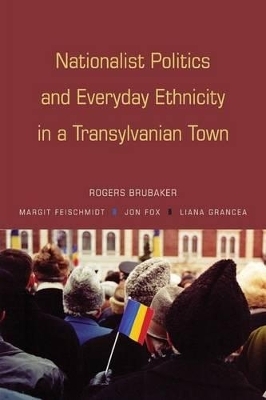
Nationalist Politics and Everyday Ethnicity in a Transylvanian Town
Princeton University Press (Verlag)
978-0-691-13622-6 (ISBN)
Situated on the geographic margins of two nations, yet imagined as central to each, Transylvania has long been a site of nationalist struggles. Since the fall of communism, these struggles have been particularly intense in Cluj, Transylvania's cultural and political center. Yet heated nationalist rhetoric has evoked only muted popular response. The citizens of Cluj--the Romanian-speaking majority and the Hungarian-speaking minority--have been largely indifferent to the nationalist claims made in their names. Based on seven years of field research, this book examines not only the sharply polarized fields of nationalist politics--in Cluj, Transylvania, and the wider region--but also the more fluid terrain on which ethnicity and nationhood are experienced, enacted, and understood in everyday life. In doing so the book addresses fundamental questions about ethnicity: where it is, when it matters, and how it works. Bridging conventional divisions of academic labor, Rogers Brubaker and his collaborators employ perspectives seldom found together: historical and ethnographic, institutional and interactional, political and experiential.
Further developing the argument of Brubaker's groundbreaking Ethnicity without Groups, the book demonstrates that it is ultimately in and through everyday experience--as much as in political contestation or cultural articulation--that ethnicity and nationhood are produced and reproduced as basic categories of social and political life.
Rogers Brubaker is professor of Sociology at the University of California, Los Angeles. Margit Feischmidt is assistant professor of anthropology at the University of Pecs, Hungary and a senior researcher at the Institute for the Study of Ethnic and National Minorities in Budapest. Jon Fox is lecturer in sociology at the University of Bristol. Liana Grancea is a Ph.D. candidate in sociology at the University of California, Los Angeles.
List of Illustrations xi Preface, by Rogers Brubaker xiii Acknowledgments xix A Note on Names, Transcriptions, and Citations xxi List of Abbreviations xxiii Introduction 1 Part One: Nationalist Politics, Past and Present 23 Chapter 1: The National Question in East Central Europe 27 Empire and Nation 30 Historical and Ethnocultural Claims in the Habsburg Lands 34 Ethnic Intermixing and National Conflict 37 Nationalist Claims and Counterclaims 39 The National Question Recast 43 World War II and After 50 Chapter 2: Transylvania as an Ethnic Borderland 56 The Three Nationes 57 1848: The Emergence of Modern Nationalism 60 Dualist Hungary as a Nationalizing State 63 Nationalization Reversed 68 War and Regime Change 76 The Return to the "Nation" 82 Chapter 3: From Kolozsvar to Cluj-Napoca 89 Kolozsvar in Nationalizing Hungary 91 From Kolozsvar to Cluj 97 Once Again in Hungary 101 The Transition to Communist Rule 105 The Romanianization of Cluj 109 Chapter 4: Cluj after Ceausescu 119 The Re-emergence of Ethnopolitical Contention 122 The Struggle over Separate Schools in Cluj and Targu-Mures 127 Gheorghe Funar and the Nationalization of Public Space 136 Reproducing Ethnicity: A Hungarian University in Cluj? 146 Counting and Categorizing 151 Conclusion 160 Part Two: Everyday Ethnicity 167 Chapter 5: Portraits 173 Mari and Family 173 Emilia 176 Karcsi and Agi 178 Ana 182 Zsolt and Kati 184 Claudiu and Lucian 188 Chapter 6: Preoccupations 191 Getting By 191 Everyday Coping Strategies 197 Getting Ahead 201 Accounting for Success 205 Conclusion 206 Chapter 7: Categories 207 Asymmetries 211 Cues 217 Doing Things with Categories 224 Ethnic and Regional Categories 231 Conclusion 237 Chapter 8: Languages 239 Interaction with Strangers 243 Private Talk in Public Places 246 Language Choice in Mixed Company 251 Language Mixing in Intraethnic Settings 259 Conclusion 262 Chapter 9: Institutions 265 Schools 269 Churches 277 Workplaces 283 Associations 287 Media 290 Conclusion 295 Chapter 10: Mixings 301 Disagreement and Conflict 303 Avoidance 307 Joking and Teasing 309 Choices 311 Conclusion 314 Chapter 11: Migrations 316 "Aici nu se mai poate" 316 Stigmatized Citizenship 321 The Ambivalent Homeland 326 Chapter 12: Politics 333 Funar 339 DAHR 343 Autonomy 346 Status Law 350 Conclusion 357 Epilogue 365 Appendix A: An Example of the Interactional Emergence of Nationalism 375 Appendix B: A Note on Data 380 Bibliography 387 Index 429
| Erscheint lt. Verlag | 21.7.2008 |
|---|---|
| Zusatzinfo | 16 color plates. 20 halftones. 16 line illus. |
| Verlagsort | New Jersey |
| Sprache | englisch |
| Maße | 152 x 235 mm |
| Gewicht | 652 g |
| Themenwelt | Sozialwissenschaften ► Ethnologie |
| Sozialwissenschaften ► Politik / Verwaltung ► Politische Systeme | |
| Sozialwissenschaften ► Politik / Verwaltung ► Politische Theorie | |
| Sozialwissenschaften ► Soziologie | |
| ISBN-10 | 0-691-13622-X / 069113622X |
| ISBN-13 | 978-0-691-13622-6 / 9780691136226 |
| Zustand | Neuware |
| Haben Sie eine Frage zum Produkt? |
aus dem Bereich


